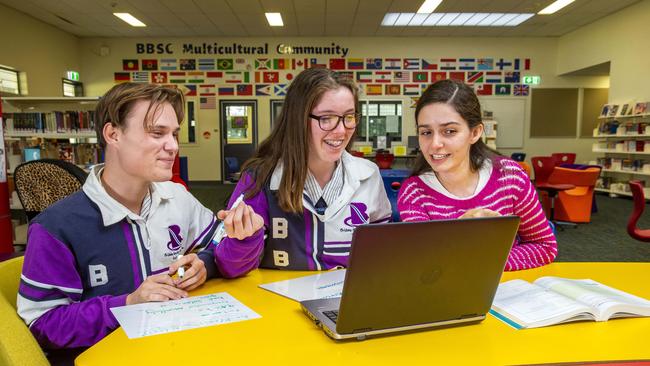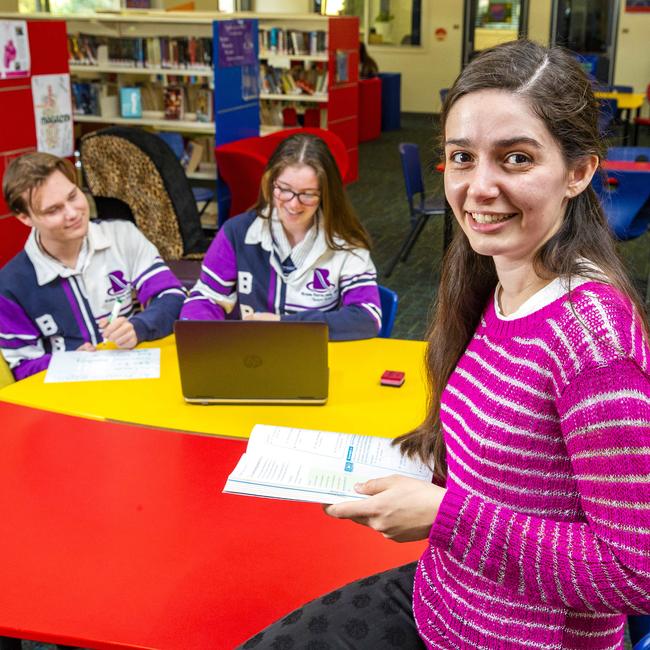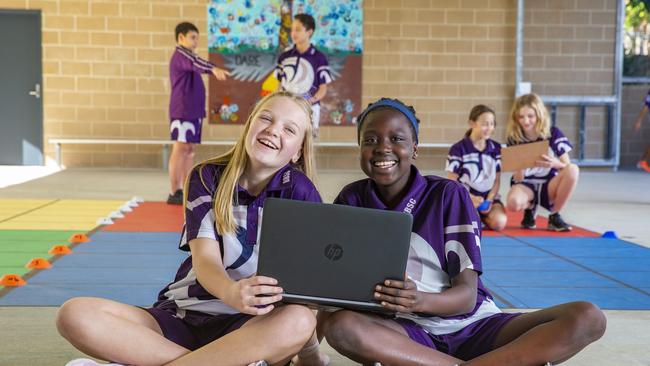Queensland’s broke schools struggling to make ends meet
Desperate schools across Queensland are being forced to cut programs and beg charities for money just to pay for the basics. Search the list of suburbs to see if your child’s school might be affected.

Education
Don't miss out on the headlines from Education. Followed categories will be added to My News.
Exclusive: Schools across the country are in the grip of a financial crisis and facing having to cut student programs with 2020 marked up as one of the worst years on record.
Fires, floods, drought and the COVID-19 pandemic have depleted the coffers of some of our poorest schools and even impacted some of the wealthiest ones.
Schools in every state and territory are increasingly having to beg charities and corporates just to pay for the basics.
The COVID-19 pandemic has exposed public schools’ reliance on parents dipping into their own pockets and without those contributions many schools are facing financial black holes which some say will take up to five years to recover from.
Some are reporting students will miss out as “extras” such as devices, sporting programs, excursions, and courses for students who need extra support, while others are warning end-of-year-celebrations such as graduation events will be impacted.
A survey by Australian charity Schools Plus – which helps connect donors with schools in need to improve student outcomes – found more than a third of schools had been impacted financially this year.
Almost 50 per cent of respondents said the COVID-19 pandemic had affected students’ learning, while almost a quarter said they needed more help to support the mental and physical wellbeing of students and teachers.
With so many families affected financially by the pandemic, some states put a ban on schools asking for the fees earlier this year but that is now being lifted.

Parents are now being asked again for their voluntary school fees although in Tasmania the practice has been banned and the government is reimbursing schools.
Some schools in Queensland thave been asking parents for their voluntary contributions, which an education spokesman said was a longstanding practice and voluntary and that “the department will continue to work closely with schools to monitor their financial circumstances and to ensure they have the resources they need to meet their obligations.”
Deakin University Senior Lecturer in Education Emma Rowe said most school are too-heavily reliant on parent contributions.
She said in some cases, schools in more affluent areas were receiving four times the amount of parents contributions compared to those in less-affluent suburbs.
“When you set up that reliance you are going to see a situation like this where the gap will increasingly widen,” Ms Rowe said.
“Schools will see an impact on their income this year without doubt especially the lower socio-economic schools but I’d say it is across all of the quartiles,” she said.

Schools Plus CEO Rosemary Conn believes demand for financial help will skyrocket, prompting the organisation to launch a new crisis appeal to raise funds for schools.
“The disadvantage caused by remoteness is being exacerbated by the bushfires but now when you think about where jobs are essentially likely to be lost as well it will start to impact in metro areas because of COVID,” Ms Conn told News Corp Australia.
News Corp spoke to one school principal who said without a charity turning up earlier in the year with backpacks filled with stationary, neither the school nor parents would be able to afford to cover the costs.
Another said they were going ‘cap in hand’ to local businesses asking for help to fund programs previously covered by fundraising.
The United Nations International Children’s Fund (UNICEF) Australia has also been inundated with requests from desperate Australian schools asking for grants.
“Demand has well exceeded our initial expectations, demonstrating that there is an ongoing need for supporting students in the schools that have been hardest hit by multiple crises,” Australian Programs Director Nicole Breeze said.

President of the P & C Federation Tim Spencer said he expected the financial fall out to last several years.
“Probably five years minimum, some of these schools have substantial issues in their communities,” Mr Spencer said.
He said money was unevenly spread across schools, with some having pots of money to lean on but others stretched too thin.
“There’s obviously a bucket of money from state and federal level that needs to be spread across all of those schools, is it done in the best and most efficient way? Probably not. There is a lot of wastage in the system.”
Australian Council of State Schools Organisations chair Andrew Bidwell agreed, saying it was times like this it becomes clear a “simple, transparent and fair funding model” is needed.
“And because it’s not in that state, schools then really need to rely on parents, families and the community to subsidise where that’s required.”
Principal Jeff Barnett from Brisbane Bayside State College said the school has had to rethink their finances ever since COVID-19 hit and they had to dip into the accounts to pay for additional support for their students.
Now, teachers are spending time outside school hours tutoring children to catch up and working out where the next grant will come from
He said with a few parents having lost their jobs the hit to schools voluntary fees along with the blow of losing fundraising is making a big dent in their budget.
“We are just doing everything we can to make sure the outcomes are still there for the students,” Mr Barnett said.
“We have had to redirect funds from other areas and there are things like camps some parents have had to pull out of, but we are still trying to make it happen for them.
“Especially for the year 12 who have had a rough trot and missed out on a lot of the things we normally do, so we are trying to make it up for them as well.”
He said the school was trying to make up for some of the lost funding with smaller fundraising activities but didn’t want to put too much pressure on families to contribute.
“We might do something with a gold coin donation, but you’re drawing from the same pool.”
